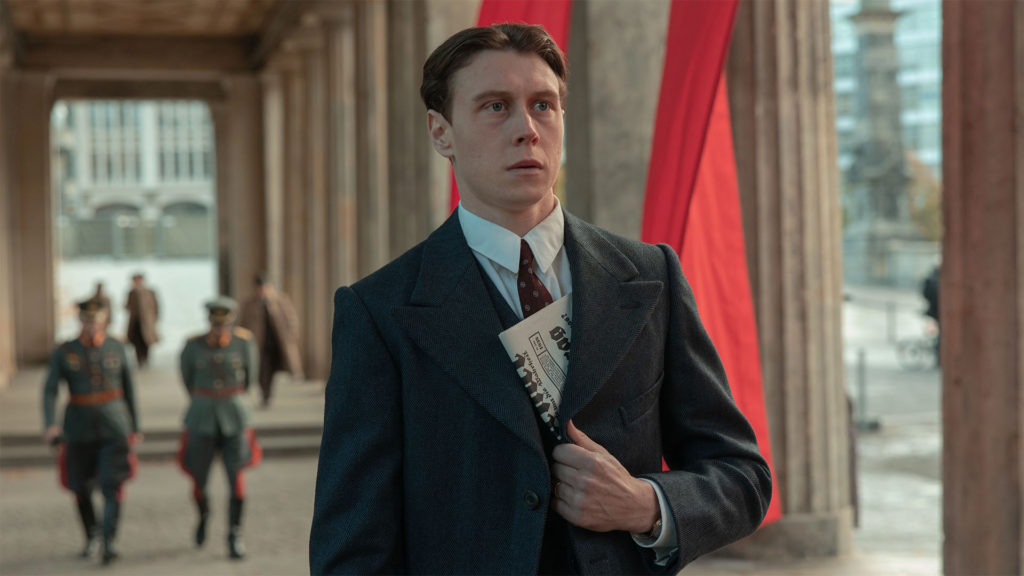Burning questions refer to issues or topics that often ensue heated conversations. “What are the odds that we could have averted the Second World War?” is one of such questions. You have probably come across it, imparted wisdom, or heard someone ramble about it. Even if you haven’t, Netflix has made sure that you do. Its recent movie release Munich: The Edge of War portrays the behind-the-scenes of World War II. Although the movie has a different approach to the theme, it is not the first to explore this dimension of WWII. This Netflix production is divergent, not unique.
Munich: The Edge of War is primarily a political espionage thriller based on Robert Harris’ novel Munich. The story starts with celebrations of life and friendship among three friends in 1932. However, the story quickly switches to tense situations in the autumn of 1938, when Adolf Hitler declares mobilization against Czechoslovakia. His motive is to regain lost German territories. If he moves against the Czechs, the English have to thwart him. The world is still dealing with the ramifications of World War I or the Great War and is not likely to survive another. Amidst all the chaos are two men, a British civil servant and a German diplomat, who can sway the fate of two countries. What is the twist? They were one of the three people celebrating life six years ago.
Firstly, the cinematography in the movie is commendable. The costumes, set design, the minor details like the hairstyle, performers’ gait, and speech patterns transport us to the late 1930s. The movie has a grim touch that alludes to an impending catastrophe. Furthermore, the gloomy and ominous background music compounds the effect. All these details may remind the viewers of a lurking threat.
The picture predominantly focuses on dialogue. Since it deals with the political aspects of WWII, there are no gripping action sequences in the movie. It is slightly slow-paced, unlike other conventional war movies. It lacks a sense of urgency, considering the circumstances.
However, the phenomenal performance of the star cast compensated for the shortcomings of the movie to an extent. The juxtaposition of Hugh, played by George McKay, and Paul, played by Jannis Niewohner, depicts two contrasting human traits. Hugh, the secretary to one of the British Prime Minister’s ambassadors, is calm and collected. He is diligent and committed to every order of his superiors. Moreover, he acknowledges the personal and professional sacrifices one has to make for perpetuating peace. However, there is a frustration in him about his life choices. His stance on the war is unwavering, but he does begin to question his methods.
George McKay’s performance in this movie after his contribution in 1917 affirms his acting ingenuity. The transition is unparalleled.
Paul, on the contrary, is a German diplomat. He is impertinent, blunt, and aggrieved. Furthermore, Paul is exasperated with the political shifts in his country. Naturally, he has a hard time dealing with orders. He was once a fervent advocate of Hitler’s ideologies. However, when Hilter’s racial prejudices and hideous ambitions became conspicuous, he had to make a stand. His intentions are noble but unhinged. A friendship that hit an impasse due to disagreement on political opinions has transformed into comradeship. These two share a mutual goal to thwart the attempts of conflict.
Jeremy Irons’ Neville Chamberlain induces some mixed feelings. The character provides insight into the mind of the British Prime Minister. The film shows the extent of his efforts to avert conflict for his people. His attempts are not only to save lives but also to leave an impression on the souls of his citizens. He is willed to try every plausible alternative. The possibility of making a mockery out of himself does not dissuade him. My problem is that he did appear delusional in some instances. He wasn’t prepared to accept the sheer force of reality. I cannot speak how well he emulated the actual Neville Chamberlain. But he did intrigue me to learn more about the then British Prime Minister.
Ulrich Matthes plays the role of Adolf Hitler. For me, he is the best personification of Hitler until now. Before Munich: The Edge of War, movies portrayed Hitler as a sporadic and aggravating person. He was tumultuous, mercurial, and horrendous. Matthes’ Hitler is much more subtle. He is cold and calculated. He still emanates the power of a megalomaniac. The character shows that Hilter wasn’t just a racially prejudiced brute but also a shrewd strategist. I think this is one of the perks of the movie. It does an excellent work of displaying how each character perceives this war. What are their mentalities?
Munich: The Edge of War, like any other movie of this genre, has broached stereotypical topics. “Is duty more important than family?” Do morals hold value in times of war? Can a few men make a difference? Furthermore, the movie has a sequence where the protagonists come in possession of a confidential document. Unsurprisingly, the document can help sway the course of the war. Also, there is a presence of a stereotypical character who somehow figures out the protagonists’ intentions.
The clichés aside, the movie challenges viewers to accept the political realities of WWII.
We know the history. We know what transpired and how matters escalated. Yet, the picture possessed elements that kept us on the edge of our seats. However, the ending was a bit convoluting. It could be that the writers did not want the characters to reach a conclusion but rather a realization. The movie is the adaptation of a book, and the makers possibly had to churn out a lot of content. Readers of the book will be able to say if it did justice to the novel. Yet, I believe the movie did not get caught in the shadow of its predecessors.
